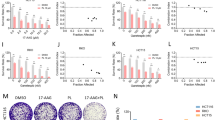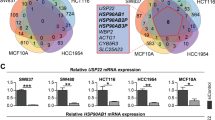Abstract
Heat shock protein 110 (HSP110) is induced by different stresses and, through its anti-apoptotic and chaperoning properties, helps cells survive these adverse situations. In colon cancers, HSP110 is abnormally abundant. We have recently shown that colorectal cancer patients with microsatellite instability (MSI) had an improved response to chemotherapy because they harbor an HSP110-inactivating mutation (HSP110DE9). In this work, we used patient biopsies, human colorectal cancer cells grown in vitro and in vivo (xenografts), and intestinal crypts to demonstrate that HSP110 is also involved in colon cancer growth. We showed that HSP110 induces colon cancer cell proliferation and that this effect is associated with STAT3 activation, specifically an increase in STAT3 phosphorylation, nuclear translocation and transcription factor activity. STAT3 inhibition blocks the proliferative effect of HSP110. From a molecular standpoint, we demonstrated that HSP110 directly binds to STAT3, thereby facilitating its phosphorylation by JAK2. Finally, we showed a correlation between HSP110 expression and STAT3 phosphorylation in colon cancer patient samples. Thus, the expression of HSP110 in colon cancer contributes to STAT3–dependent tumor growth and the frequent inactivating mutation of this chaperone is probably an important event underlying the improved prognosis in colon cancer displaying MSI.
This is a preview of subscription content, access via your institution
Access options
Subscribe to this journal
Receive 50 print issues and online access
$259.00 per year
only $5.18 per issue
Buy this article
- Purchase on Springer Link
- Instant access to full article PDF
Prices may be subject to local taxes which are calculated during checkout






Similar content being viewed by others
References
Jego G, Hazoume A, Seigneuric R, Garrido C . Targeting heat shock proteins in cancer. Cancer Lett 2013; 332: 275–285.
Saibil H . Chaperone machines for protein folding, unfolding and disaggregation. Nat Rev Mol Cell Biol 2013; 14: 630–642.
Slaby O, Sobkova K, Svoboda M, Garajova I, Fabian P, Hrstka R et al. Significant overexpression of Hsp110 gene during colorectal cancer progression. Oncol Rep 2009; 21: 1235–1241.
Dorard C, de Thonel A, Collura A, Marisa L, Svrcek M, Lagrange A et al. Expression of a mutant HSP110 sensitizes colorectal cancer cells to chemotherapy and improves disease prognosis. Nat Med 2011; 17: 1283–1289.
Mattoo RU, Sharma SK, Priya S, Finka A, Goloubinoff P . Hsp110 is a bonafide chaperone using ATP to unfold stable misfolded polypeptides and reciprocally collaborate with Hsp70 to solubilize protein aggregates. J Biol Chem 2013; 288: 21399–21411.
Shaner L, Morano KA . All in the family: atypical Hsp70 chaperones are conserved modulators of Hsp70 activity. Cell Stress Chaperones 2007; 12: 1–8.
Collura A, Lagrange A, Svrcek M, Marisa L, Buhard O, Guilloux A et al. Patients with colorectal tumors with microsatellite instability and large deletions in HSP110 T17 have improved response to 5-fluorouracil-based chemotherapy. Gastroenterology 2014; 146: 401–411 e401.
Duval A, Collura A, Berthenet K, Lagrange A, Garrido C . Microsatellite instability in colorectal cancer: time to stop hiding!. Oncotarget 2011; 2: 826–827.
Henics T, Nagy E, Oh HJ, Csermely P, von Gabain A, Subjeck JR . Mammalian Hsp70 and Hsp110 proteins bind to RNA motifs involved in mRNA stability. J Biol Chem 1999; 274: 17318–17324.
Zappasodi R, Ruggiero G, Guarnotta C, Tortoreto M, Tringali C, Cavane A et al. HSPH1 inhibition downregulates Bcl-6 and c-Myc and hampers the growth of human aggressive B-cell non-Hodgkin lymphoma. Blood 2015; 125: 1768–1771.
Yu N, Kakunda M, Pham V, Lill JR, Du P, Wongchenko M et al. HSP105 recruits protein phosphatase 2 A to dephosphorylate beta-catenin. Mol Cell Biol 2015; 35: 1390–1400.
Colgan SP, Pitman RS, Nagaishi T, Mizoguchi A, Mizoguchi E, Mayer LF et al. Intestinal heat shock protein 110 regulates expression of CD1d on intestinal epithelial cells. J Clin Invest 2003; 112: 745–754.
Berthenet K, Boudesco C, Collura A, Svrcek M, Richaud S, Hammann A Extracellular HSP110 skews macrophage polarization in colorectal cancer. Oncoimmunology (in press).
Boissiere-Michot F, Lazennec G, Frugier H, Jarlier M, Roca L, Duffour J et al. Characterization of an adaptive immune response in microsatellite-instable colorectal cancer. Oncoimmunology 2014; 3: e29256.
Olszak T, Neves JF, Dowds CM, Baker K, Glickman J, Davidson NO et al. Protective mucosal immunity mediated by epithelial CD1d and IL-10. Nature 2014; 509: 497–502.
Grivennikov S, Karin E, Terzic J, Mucida D, Yu GY, Vallabhapurapu S et al. IL-6 and Stat3 are required for survival of intestinal epithelial cells and development of colitis-associated cancer. Cancer Cell 2009; 15: 103–113.
Bollrath J, Phesse TJ, von Burstin VA, Putoczki T, Bennecke M, Bateman T et al. gp130-mediated Stat3 activation in enterocytes regulates cell survival and cell-cycle progression during colitis-associated tumorigenesis. Cancer Cell 2009; 15: 91–102.
Waldner MJ, Foersch S, Neurath MF . Interleukin-6–a key regulator of colorectal cancer development. Int J Biol Sci 2012; 8: 1248–1253.
Lanneau D, Brunet M, Frisan E, Solary E, Fontenay M, Garrido C . Heat shock proteins: essential proteins for apoptosis regulation. J Cell Mol Med 2008; 12: 743–761.
Zappasodi R, Bongarzone I, Ghedini GC, Castagnoli L, Cabras AD, Messina A et al. Serological identification of HSP105 as a novel non-Hodgkin lymphoma therapeutic target. Blood 2011; 118: 4421–4430.
Prinsloo E, Kramer AH, Edkins AL, Blatch GL . STAT3 interacts directly with Hsp90. IUBMB Life 2012; 64: 266–273.
Sato N, Yamamoto T, Sekine Y, Yumioka T, Junicho A, Fuse H et al. Involvement of heat-shock protein 90 in the interleukin-6-mediated signaling pathway through STAT3. Biochem Biophys Res Commun 2003; 300: 847–852.
Yamagishi N, Fujii H, Saito Y, Hatayama T . Hsp105beta upregulates hsp70 gene expression through signal transducer and activator of transcription-3. FEBS J 2009; 276: 5870–5880.
Biard DS, Despras E, Sarasin A, Angulo JF . Development of new EBV-based vectors for stable expression of small interfering RNA to mimick human syndromes: application to NER gene silencing. Mol Cancer Res 2005; 3: 519–529.
Jego G, Lanneau D, De Thonel A, Berthenet K, Hazoume A, Droin N et al. Dual regulation of SPI1/PU.1 transcription factor by heat shock factor 1 (HSF1) during macrophage differentiation of monocytes. Leukemia 2014; 28: 1676–1686.
Acknowledgements
This work was supported by grants from the Institut National du Cancer, Agence Nationale de la Recherche, Ligue Nationale Contre le Cancer (‘Labeled teams’ to CG and AD), the Association pour la Recherche sur le Cancer (ARC), the Conseil Regional de Bourgogne, the program ‘Investissements d'Avenir’ ANR-11-LABX-0021-01-LipSTIC LabEx. We thank the FEDER for their support. KB and SC have a doctoral fellowship from La Ligue Nationale Contre le Cancer and KB from La Foundation pour la Recherche Médicale. We thank Prof. Dr Ibrahim M. Adham, Institut für Humangenetik, University of Göttingen for kindly providing the HSP110 KO mice and P Bastable (CHU, Dijon) for the English correction of the manuscript.
Author information
Authors and Affiliations
Corresponding authors
Ethics declarations
Competing interests
The authors declare no conflict of interest.
Additional information
Supplementary Information accompanies this paper on the Oncogene website
Supplementary information
Rights and permissions
About this article
Cite this article
Berthenet, K., Bokhari, A., Lagrange, A. et al. HSP110 promotes colorectal cancer growth through STAT3 activation. Oncogene 36, 2328–2336 (2017). https://doi.org/10.1038/onc.2016.403
Received:
Revised:
Accepted:
Published:
Issue Date:
DOI: https://doi.org/10.1038/onc.2016.403
This article is cited by
-
Conserved mechanisms of self-renewal and pluripotency in mouse and human ESCs regulated by simulated microgravity using a 3D clinostat
Cell Death Discovery (2024)
-
Saccharomyces cerevisiae SC-2201 Attenuates AOM/DSS-Induced Colorectal Cancer by Modulating the Gut Microbiome and Blocking Proinflammatory Mediators
Probiotics and Antimicrobial Proteins (2024)
-
Inhibition of Hsp110-STAT3 interaction in endothelial cells alleviates vascular remodeling in hypoxic pulmonary arterial Hypertension model
Respiratory Research (2023)
-
Knockdown of HSP110 attenuates hypoxia-induced pulmonary hypertension in mice through suppression of YAP/TAZ-TEAD4 pathway
Respiratory Research (2022)
-
LINC00022 acts as an oncogene in colorectal cancer progression via sponging miR-375-3p to regulate FOXF1 expression
BMC Cancer (2022)



